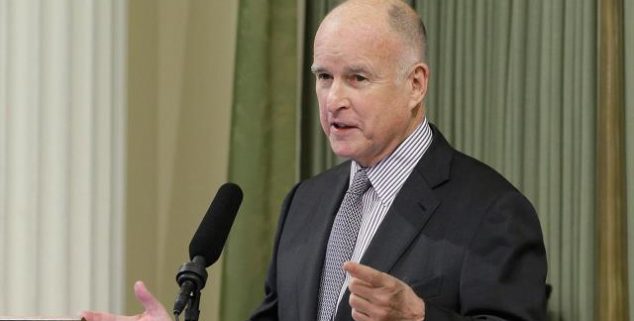Analysis
In end game, Brown reverts to the conventional
 Gov. Brown delivers his 16th state of the state address. (Photo: Screen capture, ABC 7 Los Angeles).
Gov. Brown delivers his 16th state of the state address. (Photo: Screen capture, ABC 7 Los Angeles).Jerry Brown professes to not be interested in legacies. Yet his 16th and final state-of-the-state speech last week was all about a legacy – his own.
The governor talked about how dire the state’s fiscal situation was before he became governor. Then he talked about how good things are now that he’s been in charge for the last seven years.
“I make no bones about it. I like trains and I like high-speed trains even better.” — Jerry Brown
His speech was not so much a look into the future as it was a tour of the past. During the final 12 months of his unprecedented governorship, he’ll have a chance to do both.
“Even today, you will find critics who claim that the California dream is dead. But I am used to that,” Brown said. “Back in my first term, a prestigious report told us that California had the worst business climate in America. In point of fact, personal income in 1975, my first year as governor, was $154 billion. Today it has grown to $2.4 trillion. In just the last eight years alone, California’s personal income has grown $845 billion and 2.8 million new jobs have been created. Very few places in the world can match that record.”
He pushed hard for his high-speed rail proposal, one of two infrastructure projects that, if they are ever built, will be part of his legacy, the other being his proposed tunnel channeling northern California water to the central valley and southern California,
“I make no bones about it. I like trains and I like high-speed trains even better,” Brown told a joint meeting of the Assembly and state Senate. He even included a quote from Ronald Reagan praising Japan’s high-speed bullet train.
Without mentioning Donald Trump by name, demonstrated little patience for climate change deniers.
Much of the 33-minute speech (long by Brown standards) was the traditional laundry list of gubernatorial accomplishments. He cited creation of a $7 billion budget surplus, half of which he wants to put aside in a rainy-day fund; he talked about the gas tax increase to help improve the state’s roadways; he praised the cap-and-trade program and said he would shortly unveil an expenditure plan for the money raised.
Amid the laundry list came one new proposal: Brown will shortly appoint a task force “composed of scientists and knowledgeable forest practitioners to review thoroughly the way our forests are managed and suggest ways to reduce the threat of devastating fires.”
Brown has been in the forefront of advocating for measures to deal with climate change, and without mentioning Donald Trump by name, demonstrated little patience for climate change deniers:
“Despite what is widely believed by some of the most powerful people in Washington, the science of climate change is not in doubt. The national academies of science of every major country in the world — including Russia and China — have all endorsed the mainstream view that human caused greenhouse gases are trapping heat in the oceans and in the atmosphere and that action must be taken to avert catastrophic changes in our weather systems. All nations agree except one and that is solely because of one man: our current president.”
“Our world, our way of life, our system of governance” are all at “immediate and genuine risk.”
The speech got a generally warm reception from the crowd in the green, gold and cream Assembly chamber, more so from Democrats than Republicans, even though Brown went out of his way to praise bipartisanship.
One of the most enthusiastic members of the audience, high up in the gallery, was Anne Gust Brown, the governor’s wife. She smiled widely, waved and gave every evidence of being enthralled by the whole spectacle.
She did not quite reach the achievement of Nancy Reagan, however. The late Associated Press reporter Doug Willis once wrote with a straight face that Mrs. Reagan, perched in the gallery, defied the laws of physics by looking worshipfully up at her husband while he delivered his state-of-the-state speech from the podium far below.
Even though things have improved in California over the past seven years, Brown cited “endless new weapons systems, growing antagonism among nations, the poison in our politics, climate change” as challenges Californians and the world face in coming years.
“ … our world, our way of life, our system of governance” are all at “immediate and genuine risk” and called “for courage, for imagination and for generous dialogue” from Californians, he declared.
Even though his state-of-the-state was mostly conventional, the governor did wind up his well-crafted, well-delivered finale with a Brownsian note of uplift:
“And, yes, we too will persist against storms and turmoil, obstacles great and small. The spirit of democracy never dies. It’s alive in this chamber, in the hearts of Californians and in people throughout the land.
“Let this be a great year — for California, for our nation, and for our future.”
It could have been 1975.
Want to see more stories like this? Sign up for The Roundup, the free daily newsletter about California politics from the editors of Capitol Weekly. Stay up to date on the news you need to know.
Sign up below, then look for a confirmation email in your inbox.

Leave a Reply